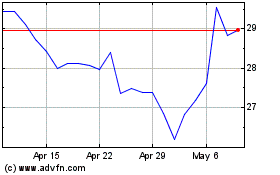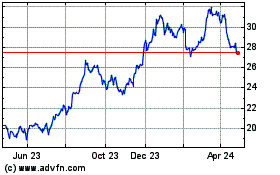The pound fell to a three-decade low against the dollar on
Tuesday, trading below the levels it hit after Britain voted to
leave the European Union in June and spurring predictions of
further volatility.
The currency fell by more than 0.8% to a low of $1.2736 in
European trading hours, reaching almost 15% below where it traded
on June 23, the day the U.K. went to the polls. The pound was
trading down against the euro at €1.1409, at its lowest level since
2013.
The latest stage in the pound's decline came after Prime
Minister Theresa May set a March date for the U.K. to begin exiting
the EU and said full access to the country's largest trading
partner was a lower priority than controlling immigration. Her
statement raised concern over Britain's ability to retain access to
the common EU market and the potential impact on crucial sectors
such as financial services.
Sterling has barely risen above $1.34 since the referendum, as
investors fret about the effects of Brexit on the British economy
and the likelihood of further Bank of England action to support
growth.
But on an upside-down day for British markets, the country's
leading share index, the FTSE 100, headed toward a record high, as
investors saw the benefits of a weaker currency for the benchmark's
companies, which make over 70% of their profits abroad. The FTSE
100 closed up 1.3%.
Currency strategists expect further volatility in sterling as
London and Brussels negotiate the terms of Britain's exit.
"The tone that Prime Minister May used has been uncompromising,
and suggests the chance of a hard Brexit, leaving the EU without
good trade terms in place," said Robert Wood, U.K. economist at
Bank of America Merrill Lynch. "That's what sterling has been
focusing on for the past two days."
The beleaguered pound is now one of the worst-performing major
currencies against the dollar. Most currencies of the Group of Ten
industrial economies, the 10 most commonly traded in
foreign-exchange markets, are up against the greenback this year.
Yet the British pound is down 13.4% against the dollar, more than
even the Mexican peso, which has fallen 10.4% because of concerns
over the outcome of the U.S. presidential election.
Analysts and lawmakers continue to debate the effects of the
weaker pound on the British economy.
Economic data in the months following Brexit has mainly been
better than expected. The pound's weakness is one reason why, given
that it makes British exports more competitive. On Monday, the
September purchasing managers index for manufacturing came in at
55.4, its highest level in two years. Any reading above 50
indicates that a sector is growing.
But many analysts believe that the good run of data won't last,
exposing the pound to further weakness.
"The recovery in several gauges of sentiment and activity after
the immediate shock has prevented more material declines, but in
our view it is only a matter of time before less positive data
starts to appear," said John Wraith, head of U.K interest-rates
strategy at UBS Group AG.
The weakness of the pound has also sent inflation higher,
particularly in the sectors of the economy most exposed to currency
shifts, such as fuels and materials. Overall import prices rose
9.3% year over year in August.
Higher inflation could make it harder for the Bank of England to
support the economy with further rate cuts and other stimulus. At
the same time, it would make life more expensive for the
British.
The pound's fall means that the FTSE's rally hasn't been all
good news for investors abroad.The FTSE is up by 11.6% since the
June 23 referendum, but the decline in sterling means the index is
still down by 3.9% in U.S. dollar terms over the same period. The
S&P 500 is up more than 2%.
As investors increasingly turn to the positions that the U.K.
and EU are staking out ahead of next year's Brexit negotiations,
the focus is likely to shift away from shorter-term economic data,
some analysts say.
The pound's recent stumble was sparked on Sunday, when Mrs. May
said in a speech at her Conservative Party's annual conference that
regaining control of immigration policy was a nonnegotiable
priority. That puts her at odds with her EU counterparts, who have
frequently said that Britain must allow freedom of movement to EU
citizens if it wishes to keep access to the common market.
A Downing Street spokeswoman declined to comment on sterling's
fall.
"I'm struck that we're now pricing sterling more off the 12-24
month outlook for politics, so the fact that the PMIs are a little
bit better doesn't matter so much," said Kit Juckes, global head of
foreign-exchange strategy at Socié té Gé né rale SA.
Many U.K. lawmakers who had supported Brexit were sanguine about
sterling's fall on Tuesday.
Graham Brady, a Conservative lawmaker, said there will be
short-term reactions to the vote but that sterling would stabilize
over the longer term.
"Over a period of time, we will see currency fluctuations
against the dollar and the euro, and in due course the pound will
settle at an appropriate level," he said from the Conservative
party conference in Birmingham.
Write to Mike Bird at Mike.Bird@wsj.com
(END) Dow Jones Newswires
October 04, 2016 12:45 ET (16:45 GMT)
Copyright (c) 2016 Dow Jones & Company, Inc.
UBS (NYSE:UBS)
Historical Stock Chart
From Mar 2024 to Apr 2024

UBS (NYSE:UBS)
Historical Stock Chart
From Apr 2023 to Apr 2024
